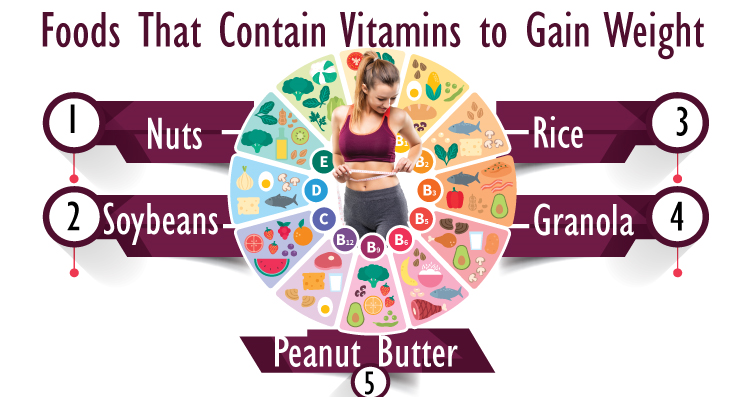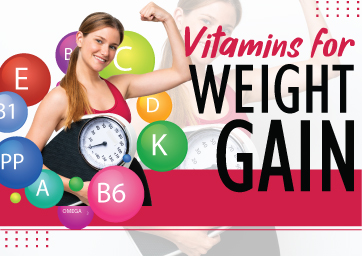What are Vitamins?
Vitamins are vital nutrients that support our body's various functions. Our bodies cannot produce vitamins (except vitamin D). Therefore we must get them through diet to meet our daily needs.
The total number of vitamins that the human body need is 13. Based on how they dissolve, they are divided into water-soluble and fat-soluble vitamins. This variation between the two groups is substantial. It tells us how each vitamin acts within the body.
Vitamin C and the vitamin B complex group dissolve in water and are said to be water-soluble vitamins. If consumed in excess, these vitamins are readily excreted in the urine.
Vitamin A, D, E, and K are fat-soluble vitamins. They are stored in the liver and fatty tissues. The body can use them as per the need. So they are not required to be provided too often.
Can Vitamins Help to Gain weight?
Vitamins' role in weight gain has been widely debated among health experts and the research community. Although vitamins may not directly promote weight gain, they might increase your hunger, resulting in weight gain.
When it comes to our appetite, B vitamins ((especially B1, B2, B3, B5, and B6) can reduce our appetite considerably. So a good place to start would be to limit foods rich in Vitamin B, such as milk products, green/leafy veggies, beans, legumes, and seeds.
Iron, zinc, and thiamin deficits are among the nutrients that might cause a decrease in appetite. If you lack these nutrients, supplements could help you regain your appetite and make it simpler to consume the calories you need to put on weight. Numerous nutrition beverages that aid in weight gain contains various vitamins and minerals.
Can Vitamins help to Gain weight?
The vitamins you need are:
Vitamin B12:
The first vitamin on our list is Vitamin B12. The relationship between Vitamin B-12 and food cravings is quite strong. Therefore, ensure that you consume more calories if you want to gain weight. You won't feel hungry if you don't have enough vitamin B-12 in your diet.
Vitamin C:
Vitamin C is at the top of our list of vitamins that make people gain weight because it can slow down the body's systems, which makes weight gain possible. You must ensure you get enough vitamin consumption if you are serious about gaining weight.
Vitamin D:
Older adults may experience weight gain from vitamin D. The body can produce some extra fat with the help of vitamin D, which is necessary for good health. People over 70 who are known to lose weight typically need to eat more vitamins. Additionally, vitamin D absorption enhances bone structure. To manage weight and promote health, vitamin D is crucial.
Foods That Contain Vitamins to Gain Weight
Here's a list of vitamin-rich food to gain weight fast:

Rice:
Rice contains many essential vitamins, such as thiamin and niacin. Its calorie count is equally high as well. One hundred grams of rice contains about 130 calories. Moreover, it's inexpensive and easy to prepare as well.
Read Also: Rice Diet Plan For Weight Loss
Granola:
Granola, the ideal breakfast food, is a mixture of honey, almonds, rolled oats, brown sugar, and sometimes puffed rice. Additionally, it has a lot of calories, protein, fiber, and vitamins. Over 450 calories are found in one cup of granola, and that's without milk!
Granola also has the benefit of being generally healthful. You can eat it all day if it doesn't contain much sugar.
Peanut Butter:
Calorie, protein, and vitamin-rich; peanut butter is a perfect weight gain option. A 100-gram serving of peanut butter meets most of our daily vitamin requirements.
● 60% vitamin E (DV)
● 84% vitamin B3 (DV)
● 29% vitamin B6 (DV)
Nuts:
Among all food types, nuts have one of the highest energy-to-weight ratios, making them one of the healthiest calorie-dense foods. Protein, vitamin K, magnesium, and manganese are abundant in nuts.
For instance, 100 grams of macadamia nuts have more than 700 calories! They are a nutritious treat that is high in fiber and calcium.
Soybeans:
Soybeans are nutritious, affordable, and readily available. They are a great source of vitamin K1, folate, copper, manganese, phosphorus, and thiamine, among other vitamins and minerals. A small serving of soybeans(about 100 grams) offers nearly 400 calories. So if you want to increase your weight fast, put soybeans on top of your priority list.
Read Also: Amazing Health Benefits Of Soybeans
Manage Weight During Vitamin Intake
Follow these recommendations to prevent uncontrolled weight gain when taking vitamins:
Exercise Regularly:
When your body starts to gain weight, you typically lose some muscle definition or acquire a stomach. Exercise can help you avoid or lessen this. If you don't have time for the gym, try some form of physical activity such as running, swimming, or cycling.
Follow a Healthy Diet:
Your diet must include adequate proteins, carbohydrates, and fats. Create a balanced diet plan keeping all the body's nutritional needs in mind.
Sleep Cycle:
If you go to bed at around 4 a.m. and wake up around noon, your nutritional changes won't make sense. Create a healthy sleep cycle first. Try to sleep between 10–11 p.m. and wake up by 7 a.m. This increases your body's metabolism and gives you more energy.
Keep an Eye on Your Calories intake:
If you want to gain weight, you should be aware of how many calories you consume daily (for example, one butterless chapati has roughly 80–90 calories). You ought to consume more calories than you expend. (For instance, if you exercise and do other things that burn roughly 1400 calories daily, you should consume at least 1700 calories daily.) Talk to an expert nutritionist to further break down and understand your calorie needs.
Excess Vitamins Impact on Health
Overdosing on some vitamins is possible, although it's pretty uncommon. A balanced diet can provide their bodies with all the necessary nutrients.
However, a severely biassed diet and especially the wrong dosage of dietary supplements can also lead to hypervitaminosis.
However, symptoms only appear after repeated overdoses over many years. Water-soluble vitamins are more seldom affected by this; typically, fat-soluble vitamins A, D, and E are the ones that might cause hypervitaminosis.
● If the vitamin is water soluble, you will pass out any excess, and there won't be any adverse effects.
● If the vitamins are fat-soluble, they can build up in your body and harm you.
You might consume too much vitamin D, calcium, and folic acid, mainly if you use supplements. A disorder known as hypervitaminosis is characterized by unusually high vitamin storage levels (over-retention of fat-soluble vitamins in the body), which can cause hazardous symptoms such as nausea, vomiting, dizziness, headache, irritability, diarrhea, convulsions, etc.
Conclusion
So what are the key takeaways for us?
● First, we discover that while vitamins may not directly cause weight gain, they are essential to any diet plan for weight gain.
● Second, they are not dangerous because the body can rapidly eliminate water-soluble vitamins. However, because fat-soluble vitamins are stored in the body for more extended periods, they should not be overconsumed.
● Finally, In terms of vitamins for weight gain, it's crucial to comprehend how each vitamin affects our body.
Want to learn more about vitamin foods and protein to gain weight? Talk to an expert now using the Kayawell platform. It's simple and easy.



 Contact Us
Contact Us






 Hospitals
Hospitals
 Doctors
Doctors
 Diagnostic
Diagnostic
 Pharmacy
Pharmacy
 Health Tips
Health Tips
 Blog
Blog


















Comments